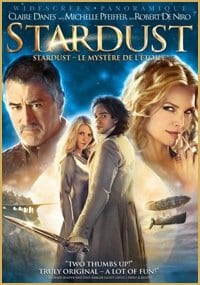Don’t get me wrong, I was often enchanted by Stardust, director Matthew Vaughan’s fairytale about a humble English youth whose quest into a magical realm leads him on adventures and toward his true love.
I was particularly taken with the story’s renovation of age-old fairytale conventions so that what could be cloyingly sentimental and paint-by-number is neither.
Still, as a gay male reviewer who is aware that a) children are its likely audience and b) queer characters in fairytales are more rare than unicorns, I felt some concern about Stardust.
I could accept that viewing Lamia, the evil witch character, as pandering to the predatory lesbian stereotype was, possibly, reading too much into things.
Captain Shakespeare, though, is another story.
As a lightning trader, Capt S and his crew are pirates of the air, all tough talk and rattled sabres.
In the seclusion of his stateroom Capt S opens his secret closet… and pulls out gowns and corsetry — he dreams of being a can-can girl.
Stardust seems conflicted about this oddball sexuality. It links homosexuality explicitly with cartoon femininity and drag, but also has Capt S play a significant parenting role to the humble hero and his striking beloved — it is he who teaches them culture and etiquette.
Later on, Capt S is ousted from his closet, but none of his crew is surprised or upset. They’ve always known their boss is a crossdressing queer. They love him all the same.
Since there’s no need for him to cease being their leader, the final scene depicts Capt S readying his men for lightning harvesting — having in the meantime returned to tough-guy pirate mode.
What might the unknowing child learn about homosexuality from Stardust?
1) Homosexuals are culturally sophisticated;
2) They’re innately drawn to feminine roles that they must kept separate from their public persona (so their sexuality is a weakness and because it’s shameful it must be kept partially hidden);
3) A homosexual can be a leader, but only if he plays it straight;
4) He cannot be a leader if he’s an effeminate male;
5) Homosexuality is far more complicated, volatile and politically-charged than heterosexuality.
Applaud Stardust for reserving so many minutes of screen time to a gay character. But questioning the value of the characterization is also a worthwhile pursuit.

 Why you can trust Xtra
Why you can trust Xtra


